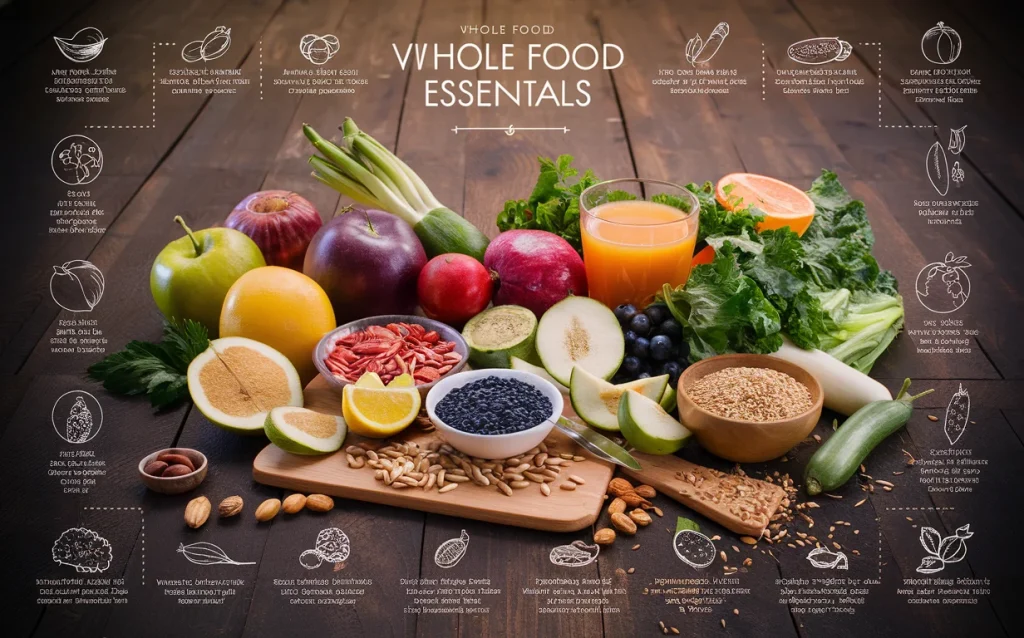Vitamins are essential micronutrients that play a pivotal role in maintaining optimal health, yet their significance is often overshadowed by the pursuit of dietary trends and quick-fix health solutions. Despite their small presence, vitamins, including vitamin C, vitamin B12, vitamin E, and folate, among others, are crucial in supporting bodily functions such as immune response, energy production, and cell repair. Understanding the basics of vitamins and their impact on the body is the first step towards achieving a balanced and nutritious diet that supports long-term health and well-being.
This article delves into the core aspects of vitamins, providing a comprehensive guide to the essential vitamins and minerals necessary for human health. It will explore the myriad of dietary sources rich in vitamin B, vitamin K, and biotin, to name a few, highlighting the importance of incorporating whole grains and leafy greens into one’s diet. Additionally, the discussion will extend to mineral supplements, the multifaceted role of multivitamins in modern diets, and the historical journey of vitamin discovery. Addressing common deficiencies, the efficacy of dietary supplements, and the ongoing debate regarding their use will offer readers a nuanced understanding of how to effectively utilize vitamins to enhance their health and prevent disease.
Understanding the Basics of Vitamins
Definition and Importance
Vitamins and minerals are essential organic compounds that our bodies utilize in small amounts for a variety of metabolic processes, crucial for maintaining health and proper body function [7]. They are obtained principally through the foods we consume, with a balanced diet typically providing all the necessary vitamins and minerals required for health [7]. These micronutrients, although not energy-providing themselves, play significant roles in the metabolic pathways that help us derive energy from macronutrients like carbohydrates, proteins, and fats [7].
Classification: Fat-Soluble vs. Water-Soluble
Vitamins are broadly classified into two categories based on their solubility: fat-soluble and water-soluble vitamins. Fat-soluble vitamins, which include vitamins A, D, E, and K, dissolve in fats and can be stored in the liver and body fat for extended periods [9][11]. These vitamins are absorbed alongside dietary fats and are generally stored until needed, which can potentially lead to toxicity if consumed in excessive amounts [11].
On the other hand, water-soluble vitamins, which encompass vitamin C and the B-complex vitamins such as thiamine, riboflavin, niacin, pantothenic acid, biotin, B6, B12, and folate, must dissolve in water before the body can absorb them [9][11]. These vitamins are not stored in the body for long durations; excess amounts are typically excreted through urine [9][11]. This characteristic necessitates a regular replenishment of water-soluble vitamins through diet or supplements to avoid deficiencies, although they are less likely to cause toxicity compared to their fat-soluble counterparts [11].
Understanding these classifications and the roles vitamins play in body functions can aid individuals in managing their intake to support overall health effectively.
The Essential Vitamins for Human Health
| Vitamin | Functions | Health Benefits |
|---|---|---|
| Vitamin A | Supports vision, immune function, and skin health | Improves night vision, boosts immune system, and promotes healthy skin |
| Vitamin C | Supports immune system, collagen production, and antioxidant activity | Enhances immune response, improves skin health, and protects against oxidative stress |
| Vitamin D | Promotes calcium absorption, bone health, and immune function | Strengthens bones, supports immune system, and may reduce the risk of certain diseases |
| Vitamin E | Acts as a powerful antioxidant, supports immune function, and promotes skin health | Protects cells from damage, enhances immune response, and maintains healthy skin |
Vitamin A: Functions and Sources
Vitamin A, known as retinol, is crucial for maintaining healthy vision, immune function, and skin health [13][14][15]. It is found in various foods, including cheese, eggs, oily fish, and fortified products [13]. Liver, a particularly rich source, should be consumed cautiously to avoid excessive intake [13]. For those seeking plant-based sources, beta-carotene, found in colorful vegetables like carrots and sweet potatoes, can be converted by the body into vitamin A [13][14].
Vitamin B Complex: Key Members and Their Roles
The B vitamins comprise a group of eight essential water-soluble vitamins that play a central role in energy production and brain function [16][17][18]. These vitamins include thiamine (B1), riboflavin (B2), niacin (B3), pantothenic acid (B5), pyridoxine (B6), biotin (B7), folate (B9), and cobalamin (B12), each contributing uniquely to health by aiding in everything from red blood cell growth to nervous system maintenance [16][17][18]. Sources of B vitamins are diverse, ranging from animal proteins and dairy to leafy greens and beans [16][17].
Vitamin C: Benefits and Natural Sources
Vitamin C, or ascorbic acid, is a potent antioxidant, vital for immune function and skin health by promoting collagen production [19][20][21]. Adults require 90 mg daily for men and 75 mg for women, with increased needs during pregnancy and lactation [19]. Natural sources include citrus fruits, bell peppers, strawberries, and cruciferous vegetables [20][21]. It is essential to consume these sources fresh or minimally cooked to preserve vitamin C content, which can be degraded by heat [19][20].
Vitamin D: Importance and How to Get Enough
Vitamin D is essential for bone health, immune function, and inflammation regulation [22][23][24]. It can be synthesized by the body through sunlight exposure and is also found in fatty fish, fortified dairy, and egg yolks [23][24]. Recommended daily intakes vary by age, but generally, adults require 600 IU, with higher amounts for older adults and those at increased risk for deficiency [22][23].
Vitamin E: Antioxidant Properties and Sources
Vitamin E, a group of eight fat-soluble compounds, serves as a powerful antioxidant, protecting the body from oxidative stress which can lead to chronic diseases [25][26][27]. It is predominantly found in vegetable oils, nuts, seeds, and green leafy vegetables [25][26]. The recommended daily allowance for adults is 15 mg, with higher needs for lactating women [26][27].
Vitamin K: Its Crucial Role in Blood Clotting
Vitamin K is vital for blood clotting and bone health. It is primarily found in leafy green vegetables, such as kale and spinach, and is also produced by intestinal bacteria [28]. Adequate intake ensures proper blood coagulation and may help prevent conditions related to bone density loss [28].
Top Vitamins for Immune Function
In addition to the aforementioned vitamins, zinc is another essential nutrient that plays a crucial role in supporting the immune system. Zinc is involved in the development and function of various immune cells, including T cells and natural killer cells, which are essential for fighting off infections and promoting overall immune system support.
| Vitamin | Benefits for Immune Function |
|---|---|
| Vitamin C | Stimulates the production of white blood cells and antibodies, enhancing the body’s ability to fight infections. |
| Vitamin D | Regulates the immune response and supports the function of immune cells, helping to prevent and combat illnesses. |
| Vitamin E | Protects immune cells from oxidative stress, maintaining their optimal function and promoting overall immune system support. |
| Zinc | Plays a crucial role in the development and function of various immune cells, including T cells and natural killer cells. |
Minerals: The Unsung Heroes of Nutrition
Understanding Their Role
Minerals are crucial for the development and proper functioning of the human body, playing vital roles in various physiological processes including bone health, muscle function, and the regulation of the enzyme systems [36]. They are essential components that help our bodies develop and function across different systems, ensuring health and wellness [36]. Unlike vitamins, minerals are inorganic and exist in the soil or water, from which they are absorbed by plants or consumed by animals [36]. Humans then ingest these essential nutrients through a diet that includes a variety of foods from all food groups [33].
Key Minerals and Their Sources
Minerals are categorized into two groups: major minerals and trace minerals. The body requires larger quantities of major minerals such as calcium, magnesium, and potassium for daily functions, while trace minerals like iron, zinc, and selenium are needed in smaller amounts but are no less important [32][33].
- Calcium is paramount for strong bones and teeth, muscle function, and nerve signaling. Dairy products, leafy greens, and fortified foods are prime sources [36].
- Iron is essential for the creation of red blood cells and transporting oxygen throughout the body. Good sources include meat, beans, and fortified cereals [36].
- Magnesium plays a role in over 300 enzyme reactions, including energy creation and protein formation. Nuts, seeds, and whole grains are excellent sources [36].
- Zinc is vital for immune function, wound healing, and cell division. Foods rich in zinc include beef, shellfish, and legumes [36].
- Selenium is crucial for reproduction, thyroid gland function, and protecting the body from damage caused by free radicals. Selenium can be found in Brazil nuts, seafood, and grains [36].
- Potassium helps regulate fluid balance, muscle contractions, and nerve signals. Common sources are fruits, vegetables, and legumes [36].
For those unable to meet their mineral needs through diet alone, supplements might be necessary, though they should be used with caution to avoid excessive intake, which can be harmful [34].
The Historical Discovery and Study of Vitamins

Early Research and Breakthroughs
The journey into the discovery of vitamins began in the early 20th century, marked by significant milestones that changed the course of nutritional science. Casimir Funk, a pioneer in this field, coined the term “vital amine” in 1913 after observing that unprocessed rice husks protected chickens from a beriberi-like condition [45]. This discovery led to the isolation of thiamine (vitamin B1) in 1926 and its synthesis a decade later, setting a precedent for vitamin research [45].
By 1932, the isolation and definitive documentation of vitamin C marked a crucial development, establishing its protective role against scurvy, a breakthrough some 200 years after James Lind’s experiments with lemons on sailors [45]. These early discoveries underscored the importance of vitamins in preventing and treating nutritional deficiencies, significantly influencing public health policies and dietary recommendations [45].
The Evolution of Vitamin Science
The mid-20th century witnessed the synthesis of all major vitamins, which were identified through rigorous animal and human studies. This era not only highlighted the nutritional basis of deficiency diseases but also led to strategic dietary enhancements to combat conditions such as pellagra (vitamin B3), rickets (vitamin D), and pernicious anemia (vitamin B12) [45].
The science of single nutrient deficiency diseases evolved further, prompting the fortification of staple foods with essential micronutrients. This included the addition of iodine to salt and niacin (vitamin B3) and iron to wheat flour and bread. Such interventions proved effective in reducing the prevalence of common deficiency diseases like goitre, xerophthalmia, rickets, and anemia [45].
These historical insights into vitamin research not only revolutionized our understanding of nutrition but also laid the groundwork for modern dietary guidelines and public health strategies aimed at preventing micronutrient deficiencies worldwide.
The Role of Multivitamins in Modern Diets
When Are They Necessary?
Multivitamins serve as dietary supplements that combine essential vitamins and minerals into a single pill, potentially including other ingredients that claim specific health benefits [40]. These supplements are designed to fill nutritional gaps not met by one’s diet alone and are particularly beneficial in certain scenarios [40][41]. For individuals with dietary restrictions or specific health conditions, multivitamins can be crucial. Those who may find multivitamins beneficial include vegetarians, vegans, people who are lactose intolerant, pregnant or breastfeeding individuals, those with unbalanced diets, and individuals diagnosed with certain medical conditions [40]. Additionally, older adults or those who have undergone bariatric surgery might also experience improved health outcomes with appropriate multivitamin use [41].
Choosing the Right Multivitamin
Selecting the appropriate multivitamin requires careful consideration of several factors to ensure it meets personal health needs and safety standards. Firstly, checking the label for the Daily Value (DV) percentage is crucial; a multivitamin should provide close to 100% of the DV for most included nutrients, though it’s important to note that some elements like calcium and magnesium may be underrepresented due to size constraints of the pills [40]. The presence of a USP (United States Pharmacopeia) seal indicates that the multivitamin meets established standards for strength, purity, and quality [40][41].
Multivitamins targeted towards specific demographic groups such as different genders or age brackets can offer tailored nutrient compositions that better address the unique needs of these groups. For instance, women’s multivitamins might contain higher levels of iron and folic acid, while senior formulations might focus more on vitamins D and B12 and less on iron [42]. Consulting with a healthcare provider is advised to determine the most suitable multivitamin, considering individual dietary needs and health conditions [42].
In conclusion, while a well-balanced diet is the best way to obtain necessary nutrients, multivitamins can play a supportive role in modern diets by addressing specific nutritional deficiencies and catering to the unique health requirements of various populations [40][41][42].
Vitamins, Deficiencies, and Health
Common Deficiencies and Their Effects
Micronutrient deficiencies affect over 2 billion individuals worldwide, particularly impacting pregnant women and children under five years of age. These deficiencies are linked to nearly 10% of childhood deaths globally and contribute to intellectual impairment, poor growth, perinatal complications, and higher morbidity and mortality [1] [21] [22]. Iron, iodine, and vitamins A, B12, and D are among the most prevalent deficiencies. For instance, iron deficiency, affecting more than a quarter of the global population, can lead to anemia, characterized by tiredness, weakness, impaired immune function, and reduced brain function [49]. Similarly, iodine deficiency, affecting nearly a third of the global population, can cause goiter and developmental issues in children [49]. Preventing these deficiencies is crucial, as they can lead to severe health issues and societal impacts, including reduced work capacity and educational achievement [1] [32].
Preventing Vitamin Deficiencies Through Diet
A balanced dietary intake is essential for preventing vitamin and mineral deficiencies. Vitamin A, crucial for vision and immune function, can be sourced from both animal products like liver and dairy, and plant-based foods such as carrots and spinach [49]. Vitamin D, necessary for bone health and immune function, is produced through skin exposure to sunlight and can be supplemented by consuming fatty fish and fortified dairy products [49]. Vitamin B12, vital for nerve function and blood formation, is primarily found in animal products, making supplementation necessary for those on plant-based diets [49]. Ensuring a diet rich in diverse food sources is key to maintaining adequate levels of these essential nutrients and preventing the associated health risks [1] [49].
The Debate Over vitamins Supplement Use
Pros and Cons of Supplement Use
Dietary supplements can play a crucial role in enhancing overall health and managing specific health conditions. However, the efficacy and necessity of many supplements remain under scrutiny and require more research to validate their claims [58]. While some supplements are known to effectively manage conditions and fill nutritional gaps, others may pose risks, especially when consumed in high doses or as substitutes for prescribed medications [58]. It’s important to note that natural supplements are not always safe, as some can cause liver damage or other severe side effects [58].
High doses of certain vitamins can lead to toxicity. For instance, excessive intake of vitamins A, D, E, and K can accumulate in the body and become harmful [55]. On the other hand, water-soluble vitamins like vitamin B6 are generally safer, but their overconsumption can still lead to nerve pain and other health issues [59]. The debate continues over the regulation and safety of supplements, highlighting the need for consumer caution and informed decision-making [56].
Guidelines for Safe Supplementation
When considering dietary supplements, it’s essential to consult healthcare providers to ensure they do not interfere with existing health conditions or prescribed medications [58]. The following guidelines can help individuals navigate the complex landscape of dietary supplements safely:
- Consultation and Approval: Always seek healthcare advice before starting any supplement, especially if you are pregnant, nursing, or undergoing surgery [58].
- Understanding Labels: Learn to interpret labels correctly. Key terms such as RDA (Recommended Dietary Allowance), AI (Adequate Intake), and UL (Tolerable Upper Intake Level) indicate the safe and effective dosage ranges for vitamins and minerals [59].
- Quality Assurance: Opt for supplements that have been verified by third-party organizations like the United States Pharmacopeia (USP) to ensure purity and safety [56].
- Natural Doesn’t Mean Safe: Be wary of supplements labeled as “natural” as this does not guarantee safety. Some natural products can be toxic or harmful [58].
- Avoiding High Doses: Do not exceed the UL for any nutrient as it includes total intake from both food and supplements, which can lead to toxicity [59].
By adhering to these guidelines, individuals can make informed choices about using dietary supplements to complement their diet, potentially enhancing their health without risking adverse effects [56][58][59].
Conclusion
Throughout this exploration of vitamins, their essential role in maintaining health, and the nuanced debates surrounding supplement use, it becomes clear that a balanced diet rich in a variety of nutrients is foundational to well-being. The journey from the historical discovery of vitamins to understanding their biochemical roles underscores the complexity and importance of these vital nutrients in preventing disease and supporting overall health. Recognizing the common deficiencies that impact billions and the targeted strategies to prevent them showcases the intricacies of nutritional science and its direct impact on global health outcomes.
Echoing the core messages of this article, it’s imperative for individuals to strive for a nutrient-rich diet while being mindful of the potential benefits and limitations of supplements. In instances where dietary choices fall short, carefully selected supplements can play a supportive role, provided they are used under professional guidance. As we navigate the ever-evolving landscape of health and nutrition, the importance of informed choices—rooted in the understanding of vitamins and minerals—cannot be overstated in advancing personal health and well-being.
FAQs
What are vitamins?
Vitamins are essential nutrients that the body needs in small amounts to function properly. They play a vital role in various bodily functions, such as metabolism, immune function, and cell growth and repair.
What are the benefits of vitamins?
Vitamins offer numerous health benefits, including supporting a healthy immune system, promoting strong bones and teeth, aiding in energy production, supporting brain function, and maintaining healthy skin, hair, and nails.
What happens if I have a vitamin deficiency?
Vitamin deficiencies can lead to various health problems, depending on the specific vitamin lacking. For example, a deficiency in vitamin C can lead to scurvy, while a lack of vitamin D can cause weakened bones and increased risk of fractures.
Are natural sources enough to obtain all the necessary vitamins?
While natural sources such as fruits, vegetables, and whole grains are an important part of a healthy diet, they may not always provide all the necessary vitamins in optimal amounts. In certain cases, vitamin supplementation may be necessary to meet specific nutritional needs.
How can I incorporate more vitamins into my diet?
You can incorporate more vitamins into your diet by consuming a variety of vitamin-rich foods, such as leafy greens, citrus fruits, berries, nuts, seeds, and lean proteins. Additionally, you can consider taking a daily multivitamin or specific vitamin supplements under the guidance of a healthcare professional.
How do I choose the right vitamin pills and supplements?
When choosing vitamin pills and supplements, it’s important to consider factors such as the quality of the product, the reputation and reliability of the brand, and any specific nutritional needs or preferences you may have. It’s recommended to consult with a healthcare professional for personalized guidance.
Can I rely solely on vitamin supplements for my nutritional needs?
While vitamin supplements can be beneficial, they are not meant to replace a balanced diet. It’s important to prioritize a nutritious diet composed of whole foods to ensure you’re getting a wide range of essential nutrients beyond just vitamins.
What is the most beneficial vitamin to take daily?
For optimal health, consider taking a multivitamin daily to ensure you’re getting key nutrients. Essential vitamins and minerals include Vitamin K, Vitamin C, Vitamin D, Iron, Calcium, Magnesium, and Omega-3 fatty acids. Omega-3s, found in fatty fish like salmon and tuna, are particularly beneficial for heart health. Additionally, incorporating probiotics into your diet can support proper digestive function.
Which three vitamins are critical for maintaining good health?
Among all the vitamins necessary for health, Vitamin D, B12, and Iron stand out as particularly important. These vitamins are crucial for overall well-being, and deficiencies in them can lead to significant health issues. They play unique and vital roles in the body, making them essential for maintaining good health.
What are the essential vitamins needed by the body?
The body requires 13 essential vitamins to function correctly. These include Vitamins A, C, D, E, K, and the B-complex vitamins (thiamine, riboflavin, niacin, pantothenic acid, biotin, B6, B12, and folate). Each vitamin performs a unique role, contributing to the body’s growth, development, and proper functioning.
Which vitamin brand is the most reliable?
When it comes to trustworthiness and quality, several vitamin brands stand out:
- Thorne Research is highly regarded overall for its product range and quality.
- MegaFood caters well to various dietary needs.
- Ritual is known for its traceable ingredients.
- HUM distinguishes itself through rigorous product testing.
- Nurish by Nature Made offers a flexible vitamin subscription service.
- Persona provides expert nutritional advice alongside its products.
- Garden of Life is celebrated for its vegan vitamin options.
References
[1] – https://www.betterhealth.vic.gov.au/health/healthyliving/Vitamins-and-minerals
[2] – https://www.nia.nih.gov/health/vitamins-and-supplements/vitamins-and-minerals-older-adults
[3] – https://www.centrum.com/learn/why-are-vitamins-important/
[4] – https://medlineplus.gov/ency/article/002399.htm
[5] – https://myhealth.alberta.ca/Health/pages/conditions.aspx?hwid=ta3868
[6] – https://www.betterhealth.vic.gov.au/health/healthyliving/Vitamins-and-minerals
[7] – https://www.betterhealth.vic.gov.au/health/healthyliving/Vitamins-and-minerals
[8] – https://www.nia.nih.gov/health/vitamins-and-supplements/vitamins-and-minerals-older-adults
[9] – https://www.hsph.harvard.edu/nutritionsource/vitamins/
[10] – https://www.hollandandbarrett.com/the-health-hub/vitamins-and-supplements/water-soluble-fat-soluble-vitamins/
[11] – https://www.verywellhealth.com/fat-vs-water-soluble-998218
[12] – https://byjus.com/biology/difference-between-fat-soluble-and-water-soluble-vitamins/
[13] – https://www.nhs.uk/conditions/vitamins-and-minerals/vitamin-a/
[14] – https://ods.od.nih.gov/factsheets/VitaminA-Consumer/
[15] – https://medlineplus.gov/ency/article/002400.htm
[16] – https://www.ncbi.nlm.nih.gov/pmc/articles/PMC9662251/
[17] – https://www.healthline.com/health/food-nutrition/vitamin-b-complex
[18] – https://www.medicalnewstoday.com/articles/325292
[19] – https://www.hsph.harvard.edu/nutritionsource/vitamin-c/
[20] – https://www.healthline.com/nutrition/vitamin-c-foods
[21] – https://ods.od.nih.gov/factsheets/VitaminC-HealthProfessional/
[22] – https://www.medicalnewstoday.com/articles/161618
[23] – https://ods.od.nih.gov/factsheets/VitaminD-Consumer/
[24] – https://www.healthline.com/health/food-nutrition/benefits-vitamin-d
[25] – https://www.ncbi.nlm.nih.gov/pmc/articles/PMC3997530/
[26] – https://ods.od.nih.gov/factsheets/VitaminE-HealthProfessional/
[27] – https://www.hsph.harvard.edu/nutritionsource/vitamin-e/
[28] – https://www.ncbi.nlm.nih.gov/pmc/articles/PMC3321262/
[29] – https://www.osmosis.org/learn/Role_of_Vitamin_K_in_coagulation
[31] – https://www.ncbi.nlm.nih.gov/pmc/articles/PMC8840645/
[32] – https://medlineplus.gov/minerals.html
[33] – https://extension.okstate.edu/fact-sheets/minerals-and-the-body.html
[34] – https://www.health.harvard.edu/staying-healthy/precious-metals-and-other-important-minerals-for-health
[35] – https://myhealth.alberta.ca/Health/pages/conditions.aspx?hwid=ta3912
[36] – https://medlineplus.gov/definitions/mineralsdefinitions.html
[37] – https://www.hsph.harvard.edu/nutritionsource/multivitamin/
[38] – https://www.hopkinsmedicine.org/health/wellness-and-prevention/is-there-really-any-benefit-to-multivitamins
[39] – https://www.webmd.com/diet/health-benefits-of-multivitamins
[40] – https://www.webmd.com/vitamins-and-supplements/how-to-choose-a-multivitamin
[41] – https://utswmed.org/medblog/multivitamins-supplements/
[42] – https://ods.od.nih.gov/pubs/Scoop%20Winter%202022.pdf
[43] – https://pubmed.ncbi.nlm.nih.gov/23798048/
[44] – https://academic.oup.com/clinchem/article/43/4/680/5640821
[45] – https://www.bmj.com/content/361/bmj.k2392
[46] – https://pubmed.ncbi.nlm.nih.gov/23798048/
[47] – https://www.advancedsciencenews.com/how-vitamins-have-shaped-human-biology-and-evolution/
[48] – https://www.bmj.com/content/361/bmj.k2392
[49] – https://www.healthline.com/nutrition/7-common-nutrient-deficiencies
[50] – https://www.ncbi.nlm.nih.gov/pmc/articles/PMC9710417/
[51] – https://www.health.harvard.edu/nutrition/the-truth-about-nutrient-deficiencies
[52] – https://thomasborlandmd.com/nutritional-deficiencies-and-how-to-avoid-them/
[53] – https://www.health.harvard.edu/nutrition/the-truth-about-nutrient-deficiencies
[54] – https://www.healthline.com/nutrition/7-common-nutrient-deficiencies
[55] – https://www.betterhealth.vic.gov.au/health/healthyliving/vitamin-and-mineral-supplements-what-to-know
[56] – https://www.ncbi.nlm.nih.gov/pmc/articles/PMC3309636/
[57] – https://www.hopkinsmedicine.org/health/wellness-and-prevention/is-there-really-any-benefit-to-multivitamins
[58] – https://ods.od.nih.gov/factsheets/WYNTK-Consumer/
[59] – https://www.webmd.com/vitamins-and-supplements/vitamins-minerals-how-much-should-you-take
[60] – https://ods.od.nih.gov/factsheets/list-VitaminsMinerals/
[61] – https://www.amazon.com/Essential-Guide-Vitamins-Minerals-Revised/dp/0062733451
[62] – https://www.amazon.com/Essential-Vitamins-Minerals-Herbal-Supplements/dp/0716022168
[63] – https://www.barnesandnoble.com/w/the-essential-guide-to-vitamins-minerals-and-herbal-supplements-sarah-brewer/1116198527
[64] – https://www.ncbi.nlm.nih.gov/pmc/articles/PMC7322674/
[65] – https://www.pennmedicine.org/updates/blogs/health-and-wellness/2020/february/the-truth-about-supplements
[66] – https://www.ama-assn.org/delivering-care/public-health/what-doctors-wish-patients-knew-about-vitamins-and-supplements











